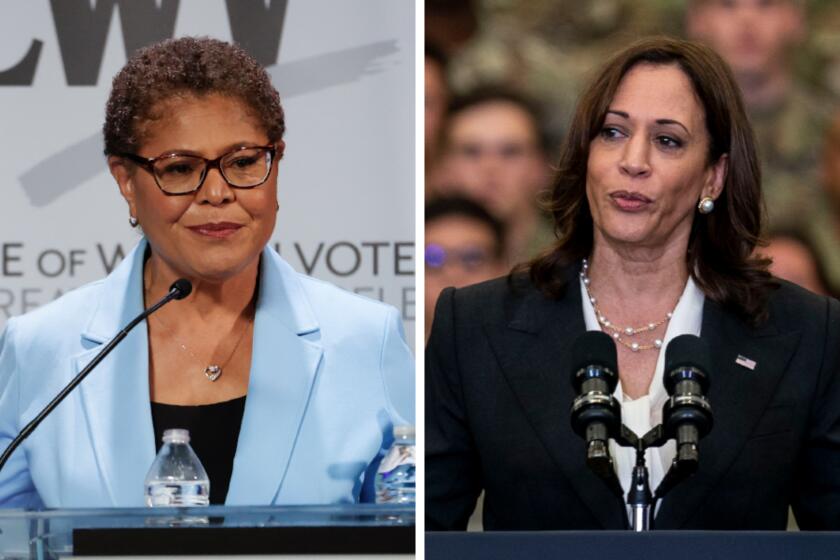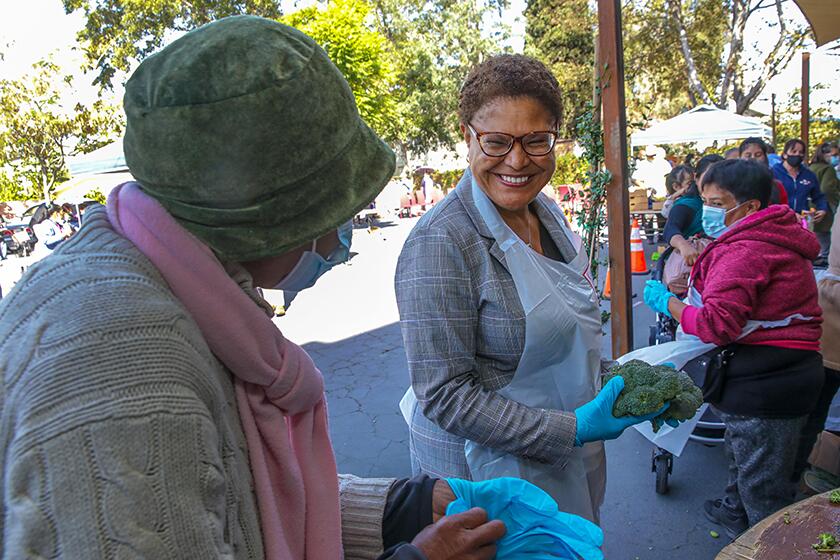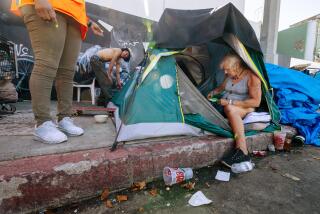With L.A. swearing in a new mayor, crews work to move homeless encampments near City Hall
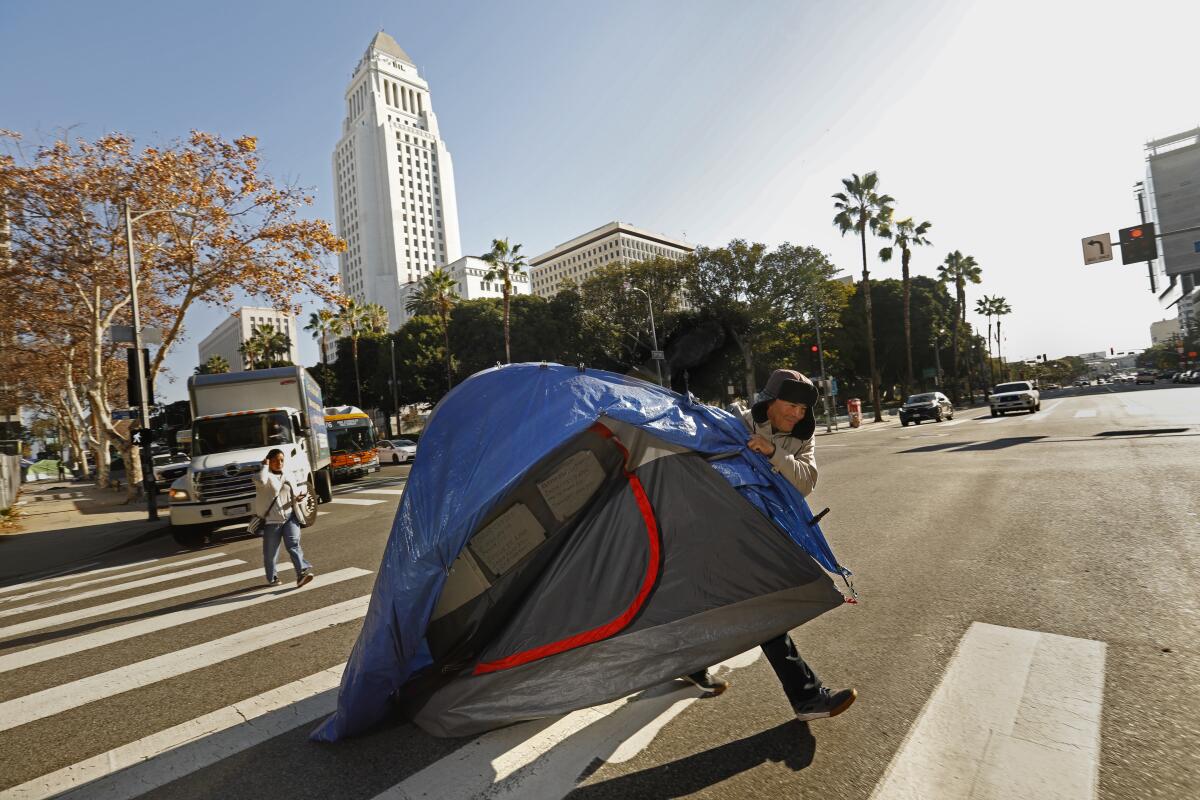
- Share via
During her campaign, Los Angeles Mayor-elect Karen Bass repeatedly promised she would make homelessness her priority on Day 1, with an immediate focus on the city’s most “challenging” encampments.
Three days before her inauguration, one particularly visible encampment — across the street from City Hall — was already receiving a swarm of attention from sanitation crews, outreach workers and other government employees.
Unhoused residents who have been living at 1st and Spring streets, some for several months, were loaded into vans Thursday and whisked to the L.A. Grand Hotel, a temporary homeless facility on Figueroa Street that is scheduled to shut down Jan. 31. Several said they were told that they needed to relocate in the run-up to Bass’ swearing-in, which had been scheduled for Sunday outside City Hall.
“They said that they were going to be coming through here and cleaning this whole section out, because the mayor is having her inauguration,” said Robert Fulps, 47. “I don’t know what cleaning this up has to do with that, but I assume ... it’ll be on the news and they want it to be clean.”
The operation underscored the magnitude of the challenge ahead for Bass, who will lead a city where more than 40,000 people live without permanent shelter and frustration is at a boiling point. The crisis bedeviled Eric Garcetti for much of his time in office. Bass has promised to act with renewed urgency, declaring a state of emergency as soon as she takes office.
Vice President Kamala Harris will visit downtown L.A. on Sunday to administer the oath of office to incoming Mayor Karen Bass, the first woman and second Black Angeleno to hold the office.
The decision to move people into the L.A. Grand on Thursday marked a change in direction for the city, which has spent months working to close facilities that participated in Project Roomkey. The federally funded program turned hotels in downtown, Hollywood and elsewhere into temporary housing for L.A.’s homeless residents after the outbreak of COVID-19.
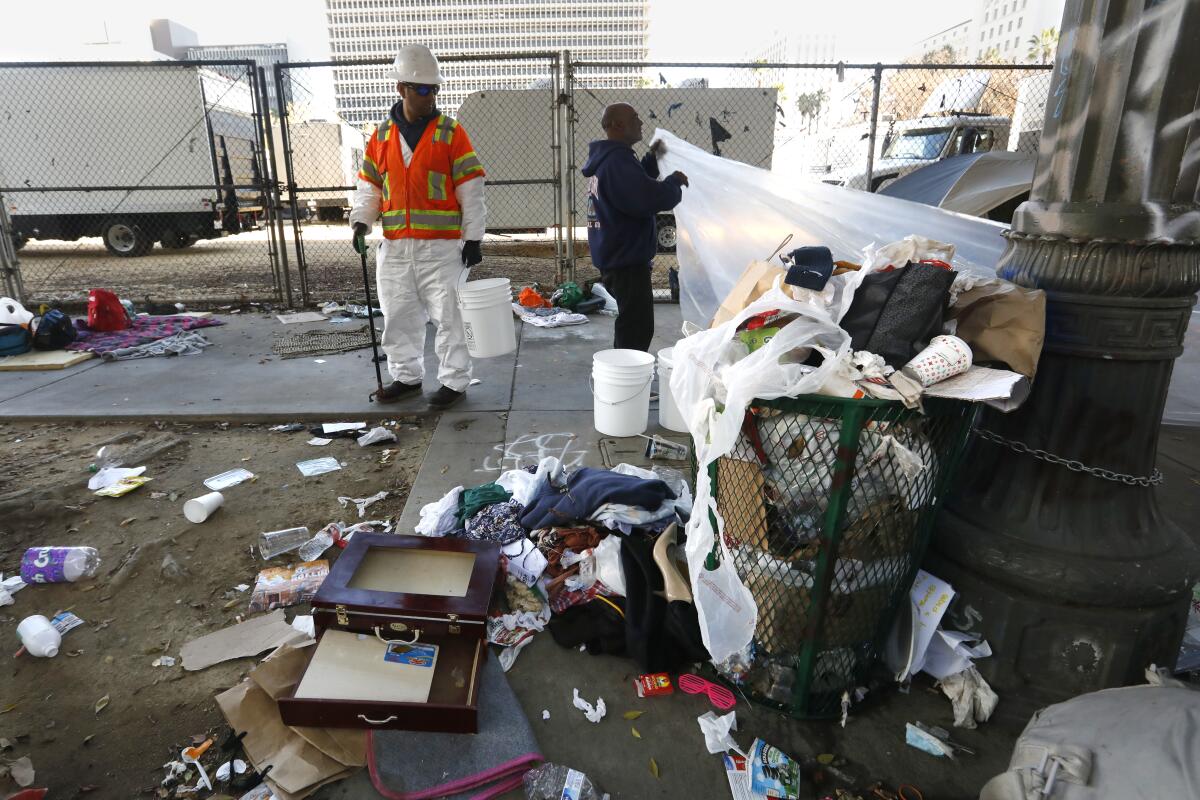
On Thursday night, Bass announced that an incoming storm had prompted her team to relocate the inauguration to an indoor location, the Microsoft Theater at L.A. Live. By then, about 20 people had moved from 1st and Spring to the L.A. Grand.
Asked about the cleanup, Bass spokesperson Zach Seidl directed questions to Garcetti, saying the mayor-elect won’t assume authority until Monday. “As to future plans to urgently bring unhoused Angelenos inside, the mayor-elect will be making major announcements starting on her first day in office,” Seidl said.
An official with the Los Angeles Homeless Services Authority, which participated in Thursday’s operation, also referred questions about the 1st and Spring encampment to Garcetti’s office. So did an aide to Councilmember Kevin de León, whose district includes City Hall and the surrounding area.
“To be unequivocally clear, the councilmember did not request this operation,” De León spokesman Pete Brown said.
Harrison Wollman, a Garcetti spokesperson, did not directly address questions about whether the encampment was moved for the inauguration. In an email, he said homeless outreach began in the area in July, with crisis response teams getting involved a month later.
“Everyone living in this location has been offered housing,” he said in an email. “And the [L.A.] Grand was identified for this location because of its close proximity, available beds, and track record of successfully placing Angelenos on a path to permanent housing.”
The operation at 1st and Spring followed months of reports from LAHSA on its effort to empty out the L.A. Grand, which had been the largest of the Project Roomkey sites, providing about 480 rooms.
Even as outreach workers were loading people onto vans, LAHSA assistant chief Nathaniel VerGow told the council’s homelessness committee on Thursday that his agency remains on track to empty the L.A. Grand by Jan. 31. He said the hotel’s population dropped to 186 earlier this week, with about four people leaving each day — many for permanent or interim housing.
“These numbers are subject to change, as the mayor’s office is potentially utilizing the Grand for a special operation,” he told the committee.
VerGow did not say what the special operation is, and none of the council members attending the meeting asked him to explain. Bass’ team did not respond to a question about whether she wants to keep the hotel open past the Jan. 31 deadline.
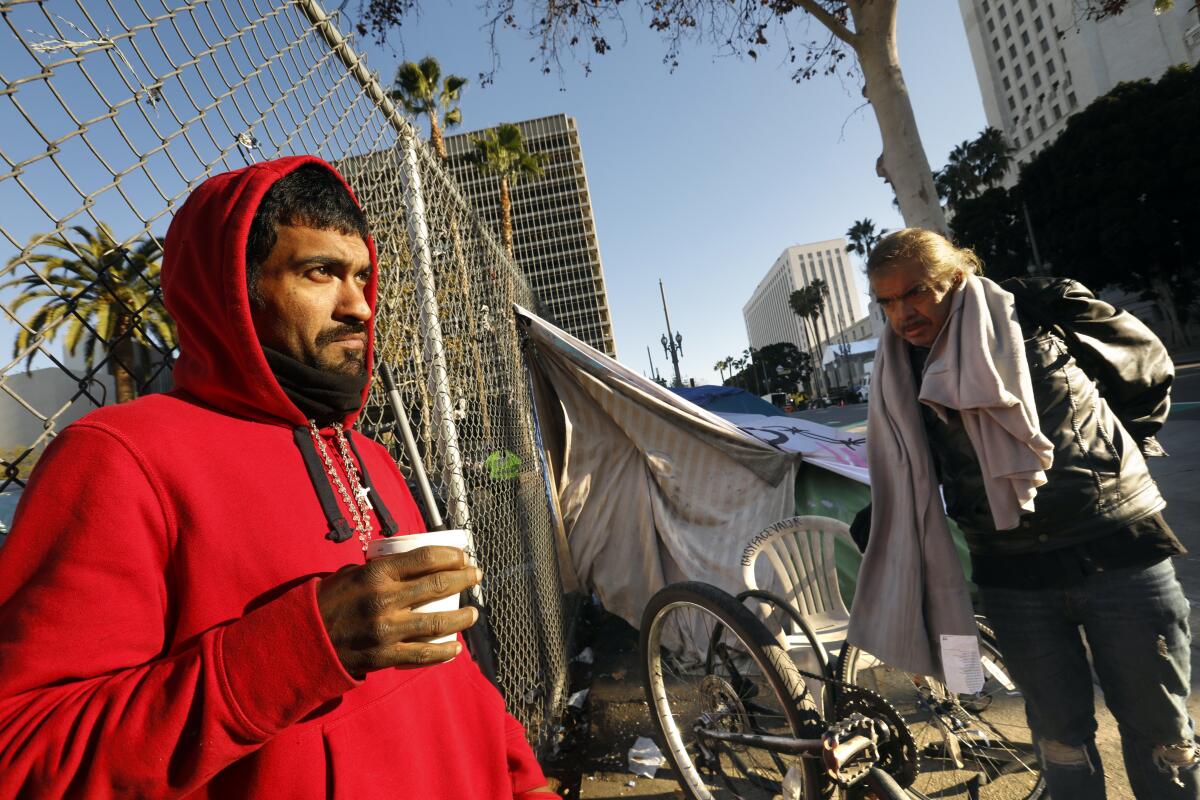
Thursday’s encampment cleanup began around 8:30 a.m., with outreach workers coaxing people out of their tents. Sanitation crews collected trash, helped prepare some belongings for storage and later power-washed the sidewalk. Over the course of several hours, more than a dozen people methodically packed their belongings and piled into white vans.
RudyMyke Negrete, a 49-year-old former hairstylist, was initially wary of the L.A. Grand offer, saying he doesn’t like being pushed from place to place. By early afternoon, however, he was looking forward to spending the night indoors in a warm bed.
“As long as I’m some place, I don’t care,” he said as he removed belongings from his tent. “But it’s just the inconsistency. They said Roomkey was done and the funding was over.”
Negrete said he too was told the encampment needed to be moved for the inauguration that was planned outside City Hall.
During Thursday’s cleanup, employees of LAHSA, the Bureau of Sanitation and the city’s CIRCLE outreach program said that tents had to be moved because of the inauguration or an unspecified weekend event. Some cited security concerns because of the presence of Vice President Kamala Harris, who is scheduled to swear in Bass.
Most of those who have been living at 1st and Spring agreed to relocate.
“They told us if we don’t move, the LAPD is going to come and move us,” said Luis Suarez, standing outside a row of tents on Spring Street on Wednesday night.
The compressed timeline between election day and inauguration is presenting challenges for Mayor-elect Karen Bass.
The first vanload of people arrived at the hotel around 10:15 a.m., lugging backpacks, tote bags and rolling luggage. Sitting in dining chairs outside the hotel, they were approached by two intake workers clutching clipboards, who asked for their names and dates of birth.
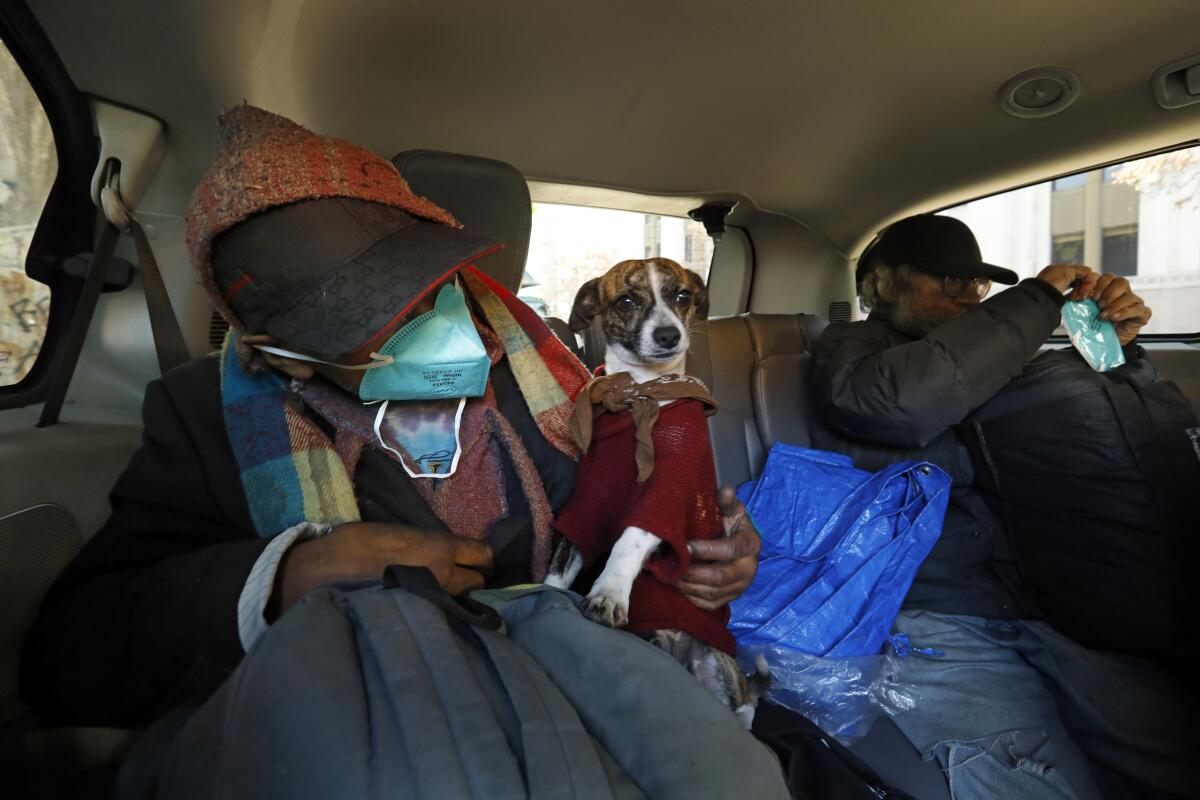
Staffers at the hotel took each person’s temperature, checked their blood pressure and swabbed their nostrils for COVID-19. Minutes later, other Project Roomkey workers approached with bottles of water and to-go boxes containing omelets.
Thomas Najera, the first to have his temperature checked, said he had been living on 1st Street since August. The 71-year-old said he had been robbed five times while living on the street, losing transistor radios, a cellphone and other belongings.
Eventually, an intake worker called him up to enter the hotel. “How bad do I smell?” he asked, adding: “Three months, same clothes.”
Outreach workers did face some resistance. One woman, who had been living in a tent with a small child, declined their initial offer of a hotel room, deciding instead to move her belongings — a tent, a stroller, a folding cot and other items — across the street, next to the south lawn of City Hall.
Hours later, she and her green-and-white tent were gone, and it was not clear whether she had changed her mind. Left behind were a cooler, four jugs of water and an assortment of children’s shoes, sandals, toys and crayons.
By 5 p.m., eight tents still remained near 1st and Spring.
Sanitation officials posted a sign saying they plan to carry out another cleaning there on Friday, along with other nearby streets.
More to Read
Sign up for Essential California
The most important California stories and recommendations in your inbox every morning.
You may occasionally receive promotional content from the Los Angeles Times.
